Hey there!
I’m a now first-year Ph.D. student of Computer Science at Northwestern University. Before that, I earned M.S. of Computer Science at Duke University, where I am very fortunate to be advised by Prof. Jennifer Groh. I got my B.Eng. in Computer Science and Technology from Nanjing University of Posts and Telecommunications (NJUPT), where I won tens of awards in programming competitions including a silver medal in ACM-ICPC and champion in RoboCup.
You can find my CV here: link
My research interest lies in integrating hardware and software in both computer science and brain science. To be specific, I am interested (but not confined) in these fantastic and extensive areas:
- From computer science to brain science: High-dimensional data analysis, Computational neuroscience, Brain network, Human Cognition Analysis, etc.
- From brain science to computer science: Bio-inspired computation, Neural Symbolic Machine Learning, Neural network analysis, etc.
- Overlap: Brain-computer interface, Illusion in machine, Reinforcement learning, Natural Language Processing, Machine learning, Robotics, Multi-modal perception, Consciousness, etc.
For now, I am focusing on the Perception in Robotics area.
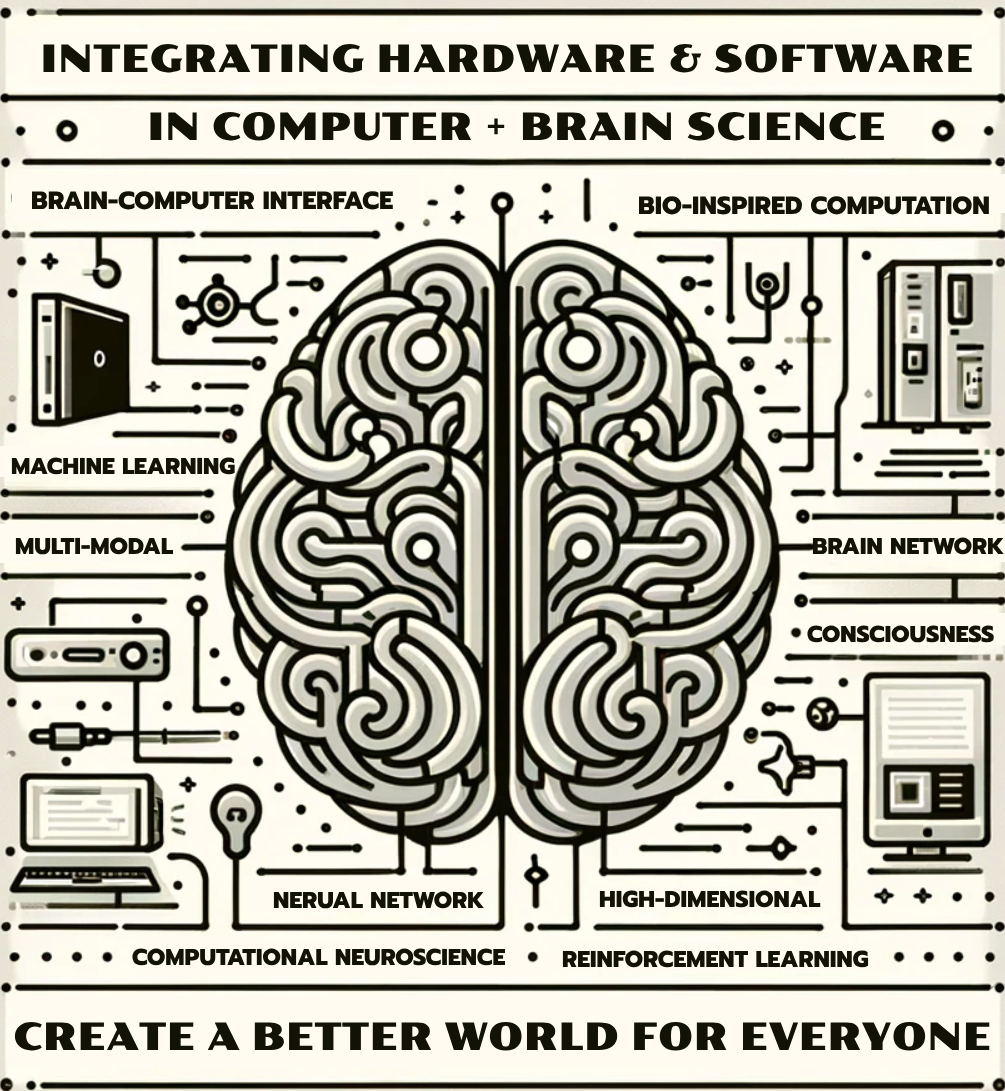
Past Experience
The same as my research interest, my past experiences can be categorized into hardware, software, brain, and their integrations.
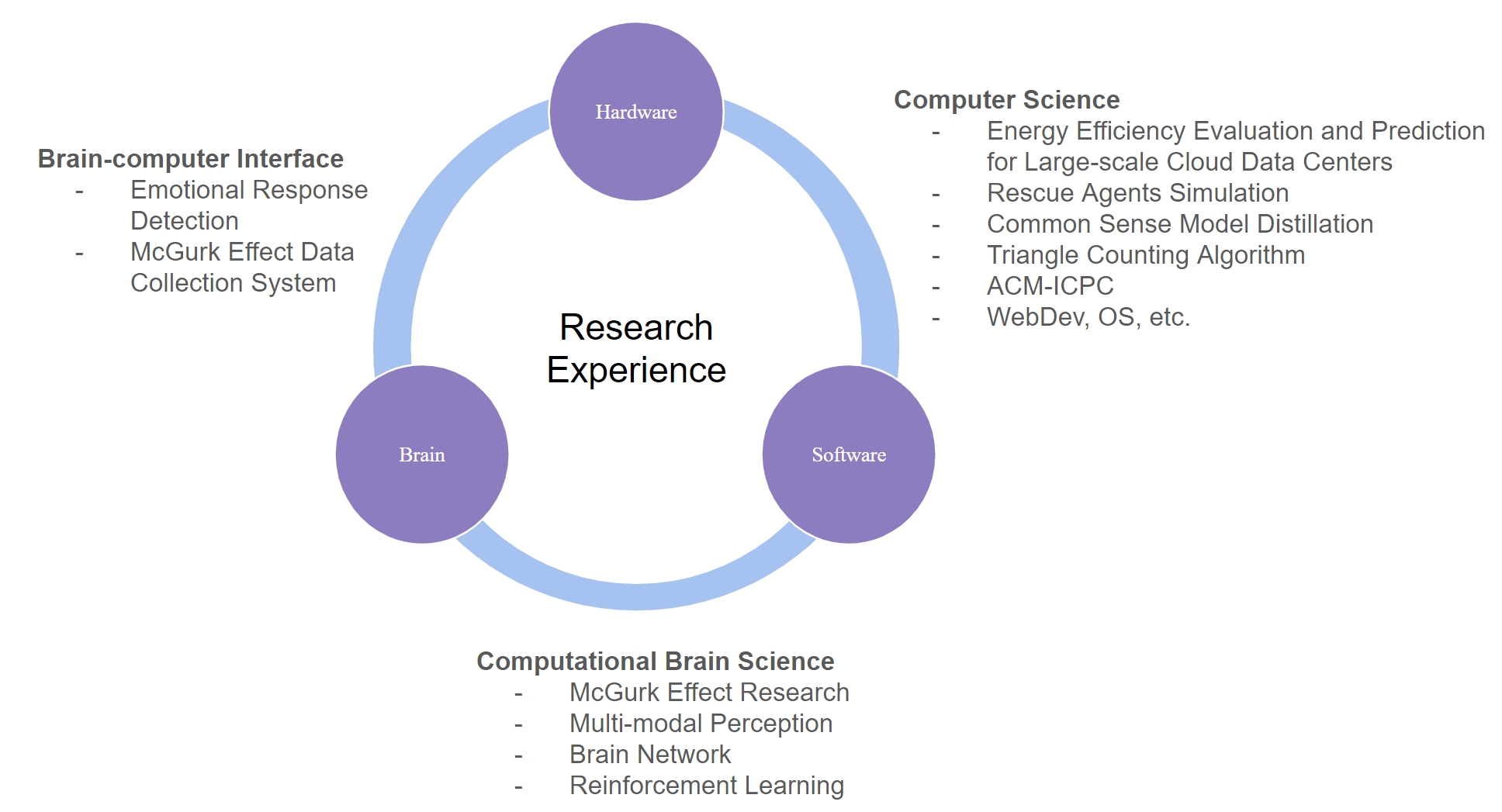
Research Experience
McGurk Effect Research [Report] Jan. 2023 - Present
Research Assistant, Duke University (Supervised by Professor Jennifer Groh)
Led an individual interdisciplinary research project at the intersection of computer science and brain science, based on the McGurk effect, an illusion showing visual stimuli can alter auditory perception, to probe human multi-modal perception
Details (click to expand)
- Developed video stimuli that can elicit the McGurk effect on subjects with a 100% success rate, exceeding existing stimuli
- Engineered a comprehensive system integrating hardware and software from scratch, including an eye tracker and in-ear microphones, coupled with Psychtoolbox and JACK for efficient data capture in a sound-proof booth
- Executed end-to-end experimental procedures with 15 participants, involving script writing, participant recruitment, and ear-canal sound data collection
- Applying interdisciplinary analytical methods, including sliding windowalignment, Mann-Whitney U test, and Fast Fourier Transform (FFT), for precise data analysis and visualization, to figure out what is inputted to the brain for processing

Data-efficient Robust Single-life Reinforcement Learning Oct. 2023 - Present
Researcher, Duke University (Supervised by Professor Pan Xu)
Proposed a novel fine-tuning algorithm in Reinforcement Learning, emphasizing robustness against dynamics change and data efficiency, adaptable to real-world single-life environment
Details (click to expand)
- Conducting comprehensive simulation tests to validate the algorithm's efficacy using the OpenAI Gym environment
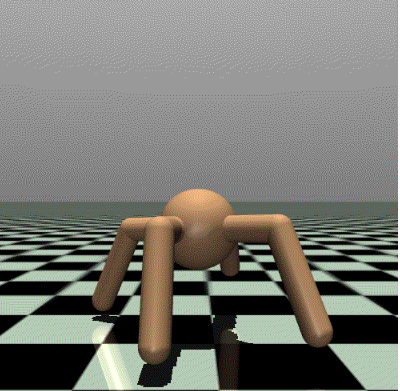
Energy Efficiency Evaluation and Prediction for Large-scale Cloud Data Centers Dec. 2018 - June 2021
Research Assistant, NJUPT (Supervised by Professor Yun Li, Undergraduate Thesis)
Developed methods to evaluate and predict the energy efficiency of large-scale cloud data centers, Collaborating with ten people of different levels as the only undergraduate student
Details (click to expand)
- Conducted energy consumption modeling for servers and Docker containers, built time-series models for CPU-intensive, memory-intensive, and IO-intensive task flows, and analyzed energy usage across memory, CPU, and hard disks
- Implemented OpenStack and Docker systems, simulating cloud data center environments, and collected data on energy usage and hardware specifications Psychtoolbox and JACK for efficient data capture in a sound-proof booth
- Specialized in hard disk failure prediction, applying techniques such as undersampling, automated machine learning, and online learning to address proposed issues in this task like data imbalance, conceptual drift, and feature divergence, achieving a prediction accuracy of 90.9% and a Matthews correlation coefficient (MCC) of 80.3%
- Received excellent undergraduate thesis award (Top 5%) for products based on related research results
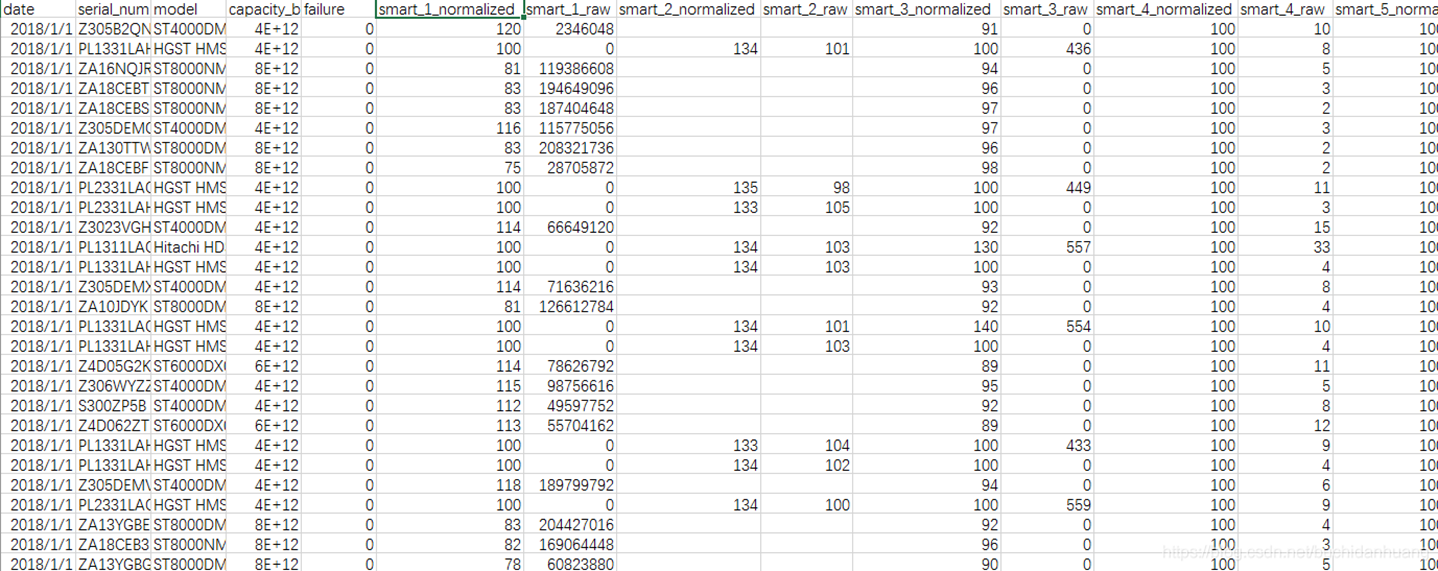
Project Experience
Emotional Response Detection through Brain-Computer Interface [Report] Mar. 2023 - May 2023
Team Leader, Brain-Computer Interface (BCI) Course design at Duke University
Conducted EEG data collection using non-invasive P300 brain-computer interface and BCI2000 systems, capturing subjects’ emotional responses to images from different emotional categories in the Geneva Affective PicturE Database (GAPED)
Details (click to expand)
- Built and optimized deep learning models for wavelet analysis, incorporating GRU and LSTM architectures, achieving an F1 score of 0.72 in differentiating reactions to pleasant and unpleasant stimuli
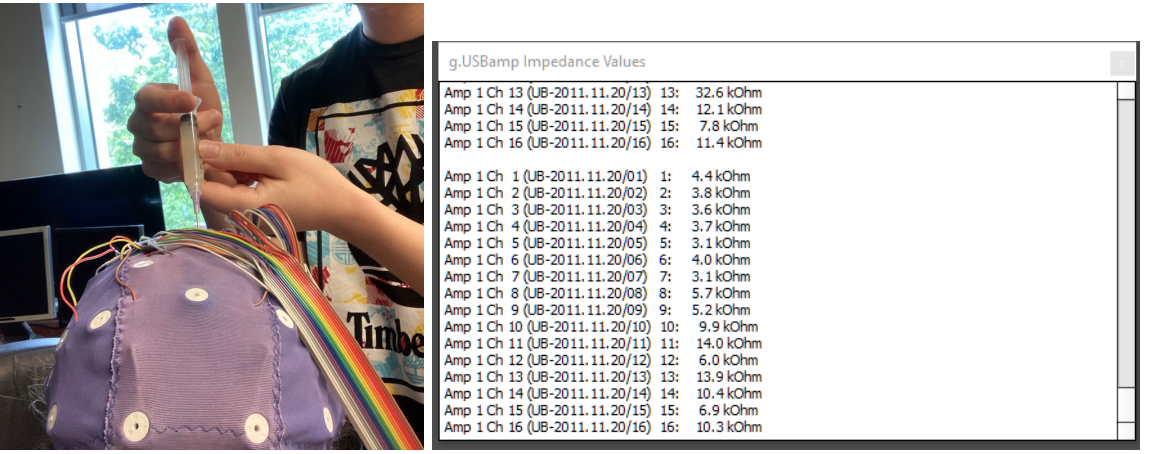
Mini Amazon [Github] Mar. 2023 – Apr. 2023
- Team Leader, Engineering Robust Server Software course design at Duke University
Led the development of a multi-threaded e-commerce platform simulating Amazon, encompassing both front-end and back-end functionalities, including product browsing, cart management, order placement, and status tracking
Details (click to expand)
- Realized system connection with 2 UPS groups to simulate real-world website, employed Google Protocol Buffer Messages for efficient inter-system communication and materialized features like order dispatch and warehouse management
- Packaged the application using Docker Compose for streamlined deployment, and facilitated external access via Nginx
Common Sense Model Distillation Research [Report] [Github] Oct. 2022 - Dec. 2022
- Team Leader, Natural Language Processing (NLP) course design at Duke University
Distilled 15 student models, including GPT2 and GPT, varying in size and architecture, from a large teacher language model, using corpus expansion and filtering techniques in Symbolic Knowledge Distillation, in order to determine the optimal design of a smaller language model that captures common-sense knowledge and to improve it
Details (click to expand)
- Led a six-person team for manual evaluation of model outputs, and innovatively employed a critic model based on RoBERTa to automate this evaluation process and to enhance beam search performance, achieving a 72% acceptance rate improvement

Competition Experience
Design and Optimization of Triangle Counting Algorithm in Large-scale Graph Data Sept. 2019 - Dec. 2019
Lead Developer, Big Data & Computational Intelligence Contest (China Computer Federation)
Developed an efficient algorithm for counting triangles in large-scale graphs (40G), improving computation speed by 95% using CPU (OpenMP) and GPU (CUDA) parallel computing with limited resources (60G memory, 16G graphics card)
Details (click to expand)
- Employed Compressed Sparse Rows format for graph representation, transformed the Triangle Counting Forward Algorithm into a parallel intersection algorithm based on Single Instruction Multiple Data on GPUs and devised slicing and crossing techniques for handling memory limitations
- Optimized GPU resource utilization through node-parallelism, multi-block delay hiding, and shared memory with atomic operations, ensuring both computational speed and accuracy

Rescue Simulator Feb. 2019 - April 2019
Team Member, 2019 RoboCup China Open
Developed rescue robot programs for the simulation of post-earthquake urban environment, focusing on agent behavior, task execution, and communication within varied roles, including firefighter, police, ambulance, etc.
Details (click to expand)
- Created an efficient task allocation strategy for firefighter agents based on distance to fires, employing the Hungarian Algorithm in the central agent to enhance command on those agents, improving firefighting efforts of 10% performance
- Performed extensive code refactoring to align with new competition standards, introduced central agents, and implemented a pre-computation process, resulting in a clearer system architecture and improved computational efficiency
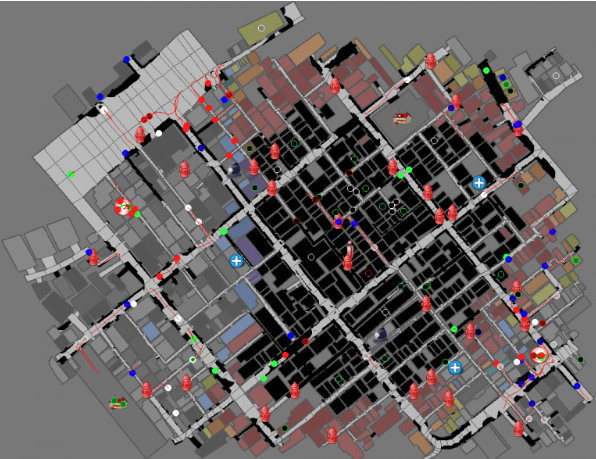
International Collegiate Programming Contest (ACM-ICPC) Oct. 2017 – June 2019
Team leader, coached by Professor Zhi Chen at NJUPT
Led a three-person group coding with only one computer to solve problems related to various algorithms and math knowledge within five hours, allocated tasks to optimize problem-solving efficiency during contests
Details (click to expand)
- Coordinated and frequently engaged in rigorous training sessions, mastered diverse algorithmic knowledge in domains including dynamic programming, graph theory, data structures, etc., through practices
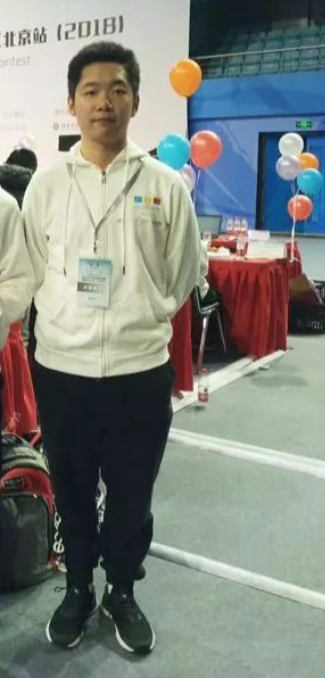
Social Work Activity
Founder & Mentor of Algorithm Study Group June 2018 - Sept. 2020
Science and Technology Association, School of Computer Science, NJUPT
Founded and led an algorithm study group to help students from diverse backgrounds, especially from underrepresented communities, engaged in publicity recruitment, and grew the team to over 50 members
Details (click to expand)
- Conducted weekly programming and algorithmic lessons for the entire school, designed and organized school-level programming competitions fostering academic inclusiveness and a deeper understanding of algorithms among students
Volunteer Lecturer, ICPC (International Collegiate Programming Contest) School Team Feb. 2019 – June 2019
NJUPT
Organized and managed training sessions, meticulously selecting problem sets and coordinating contest logistics
Details (click to expand)
- Conducted both online and offline lectures and Q&A sessions to support team members' understanding and progress
Awards & Achievements
| Award | Year |
|---|---|
| Excellent Undergraduate Thesis Award (Top 5%), NJUPT | 2021 |
| Elite Student (Top 1%), NJUPT | 2019 & 2020 |
| Enterprise Scholarship (Top 2%), NJUPT | 2019 |
| Excellent Social Work Award, NJUPT | 2018 & 2020 |
| Top 3%, Big Data & Computational Intelligence Contest | 2019 |
| Champion (First Prize), RoboCup China Open | 2019 |
| Silver Medal, The ACM-ICPC Asia Regional Contest | 2018 |
| Bronze Medal, China Collegiate Programming Contest | 2018 |
Core Competencies
Programming Languages
C, C++, Python, Java, Lisp, Assembly Language, MATLAB, JavaScript, Go, Ruby, Rust
Tools
Docker, OpenStack, Git, Unix/Linux, Qt, Visual Studio Code, MySQL, Psychtoolbox, BCI2000
Machine Learning
TensorFlow, Scikit-learn, PyTorch, Keras, torch-nlp, OpenCV, pillow, Hugging Face
